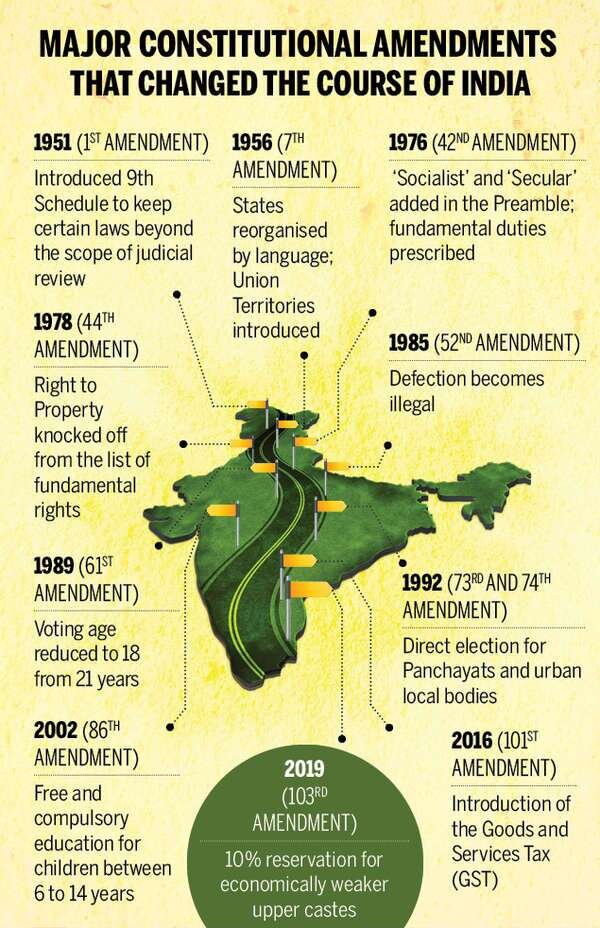Indian Polity
Republic Day 2022
- 27 Jan 2022
- 7 min read
For Prelims: Features of Indian Constitution and the related background.
For Mains: Significance of Republic day and threats to Indian Democracy.
Why in News
Republic Day (73rd) is celebrated every year on 26th January to commemorate the adoption of the Indian Constitution, which came into effect on this day in 1950.
- The Constitution is the supreme law of the land and citizens are expected to abide by it.
Key Points
- Background:
- India became an independent nation on 15th August, 1947 — a date thrust upon by Lord Louis Mountbatten, as it marked the second anniversary of Japan’s submission to allied powers after World War II.
- After India became independent, it did not have its own constitution. The laws were based on a common law system and a modified version of the “Government of India Act, 1935”, which was brought in by the British government.
- Approximately two weeks later, a Drafting Committee was appointed to draft the Indian Constitution with Dr BR Ambedkar as the chairman. The Indian Constitution was finally ready and adopted on 26th November, 1949 (Constitution Day).
- The Constitution came into effect after two months, on 26th January, 1950.
- The Indian National Congress, on 19th December, 1929, passed a historic resolution of “Purna Swaraj” or complete self-rule at its Lahore session.
- It was declared by the Congress party that 26th January, 1930, will be celebrated as “Independence Day” by the Indians.
- Pandit Jawaharlal Nehru, who was the President of Congress party, hoisted the tricolor on the banks of the Ravi river in Lahore. This day was celebrated as Poorna Swaraj day for the next 17 years.
- Thus, when the Constitution of India was adopted on 26th November, 1949, many considered it necessary to celebrate and enforce the document on a day associated with national pride, which was – 26th January.
- Significance:
- Republic day is a monumental day in Indian history because it was on this day that India adopted its own Constitution and declared its own laws of the land.
- The British colonial Government of India Act (1935) was finally replaced and the country was set to make a fresh start.
- Additionally, it was also on this day that the Preamble of the Constitution of India came into effect.
- The Preamble is largely a comprehensive statement that presents the key principles of the Constitution.
- On this day India shed the last relic of the colonial system and effected a new dawn by becoming a Sovereign Democratic Republic.
- The day is an occasion to commemorate the values of our democracy and Republic, to reaffirm our commitment to liberty, fraternity and equality across our society and among all our citizens.
- The day celebrates the desire of a huge nation that wants to be governed through one single constitution giving another example of India’s unity in diversity.
- Threats to Indian Democracy:
- Although India has made a place for itself as one of the fastest growing economies in the world, it loses behind a lot in the name of growth.
- Poverty remains the biggest challenge of present day India, the majority of the people continue to live below the poverty line with a huge divide between the rich and the poor.
- Gender discrimination remains at all level with skewed female ratio, few economic opportunities, disparities in wages, violence, malnutrition etc.
- Communalism and religious fundamentalism have acquired a very dangerous form and alarming proportion in India. It is an affront to India’s nationalist identity and a tragic setback to its evolving secular culture.
- Indian democracy also struggles with regionalism which is primarily an outcome of regional disparities and imbalances in development.
- Continued feeling of inequality both among and within state creates a feeling of neglect, deprivation and discrimination.
- Elections which serve as the most evident expression of democracy are affected by money and muscle abuse by politicians and political parties.
- Most of the politicians have pending criminal cases against them, source of funding for elections remains questionable.
Sovereign, Democratic, Republic
- Sovereign: The word ‘sovereign’ implies that India is neither a dependency nor a dominion of any other nation, but an independent state. There is no authority above it, and it is free to conduct its own affairs.
- Democratic: It is based on the doctrine of popular sovereignty, that is, possession of supreme power by the people.
- Republic: Preamble indicates that India has an elected head called the President. He is elected indirectly for a fixed period of five years.
Way Forward
- Our Republic has come a long way and we must appreciate how far successive generations have brought us. Equally, we must appreciate that our voyage is far from complete.
- There is a need to recalibrate our yardstick of achievement and success - from quantity to quality; from a literate society to a knowledge society in order.
- No conception of India's development can be complete without a salute to our spirit of inclusiveness. India's pluralism is its greatest strength and its greatest example to the world.
- The "Indian model" rests on a tripod of diversity, democracy and development where we cannot choose one above the other.
- The nation needs to encompass all segments and all communities, so that the nation transforms into a family that invokes, encourages and celebrates the uniqueness and potential in each person.





